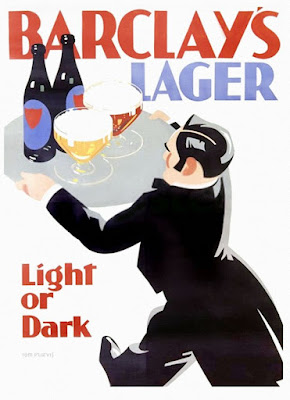Good news for me, as it gives me a chance to preview (use a recipe I've already written) a recipe from "Blitzkrieg!". Though for any of the four options I could have found a recipe in the book. For a book about UK brewing in WW II, it has quite a lot of Lager recipes. 37 in all. Though there are well over 500 recipes in total. Not that huge a percentage, really.
Lucky old Dark Lager has seen its gravity increase by 0.5º compared with the previous year.
The grist is essentially identical to the previous year’s. Except the lager malt is now from two different English maltsters.
They weren’t brewing a great deal of Dark Lager. This was gyle 101 overall, but only the second brew of Dark that year. 2% of their Lager output wasn’t a huge amount of beer.
The mashing scheme remains much the same, though it isn’t specified when the grain was added. Perhaps they didn’t need to, as it was now all going in at the start. As in the case of Sparkling Beer.
| mash in | 129º F | 30 minutes |
| raise to | 158º F | 30 minutes |
| raise to | 170º F | |
| hold at | 170º F | 35 minutes |
| Sparge at | 175º F |
It looks like stocks of Bohemian Saaz had finally been exhausted. There are still Belgian Saaz from the 1939 crop and Fuggles, also from 1939. Both cold stored.
| 1941 Barclay Perkins Dark Lager | ||
| lager malt | 10.00 lb | 78.43% |
| crystal malt 80 L | 2.50 lb | 19.61% |
| roast barley | 0.25 lb | 1.96% |
| Fuggles 90 mins | 0.75 oz | |
| Saaz 30 mins | 0.75 oz | |
| OG | 1056 | |
| FG | 1017 | |
| ABV | 5.16 | |
| Apparent attenuation | 69.64% | |
| IBU | 15.5 | |
| SRM | 19 | |
| Mash at | 158º F | |
| Sparge at | 170º F | |
| Boil time | 90 minutes | |
| pitching temp | 46º F | |
| Yeast | Wyeast 2042 Danish lager | |

A very high FG for a lager innit? Is this the FG pre-lagering?
ReplyDeleteMatt Boothman,
ReplyDeletethe attenuation of Lager used to be crap. You should see the FGs of 19th-century Munich beers. But this is pre-lagering.
An FG like that would have made for a hearty, nutritious, sweetish (maybe?) beer. Is it simply an English brewer's homage to a dunkel?
ReplyDeleteWhat informed the yeast choice, Ron? Just a good lager strain, or do you know that English breweries sourced their lager yeast from the Carlsberg labs?
Actually, an attenuation of 70 percent is pretty good for a beer that is 20% crystal malt.
ReplyDelete